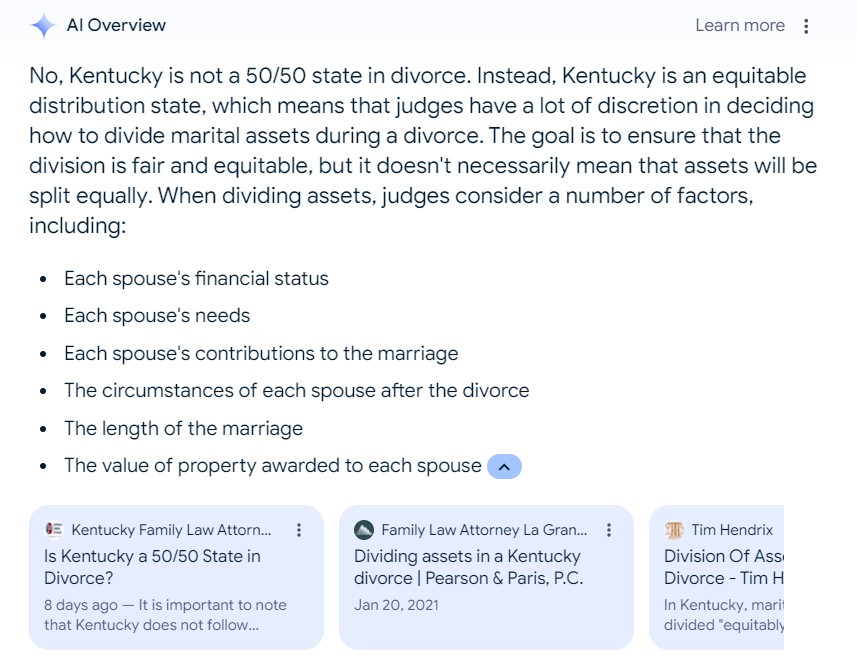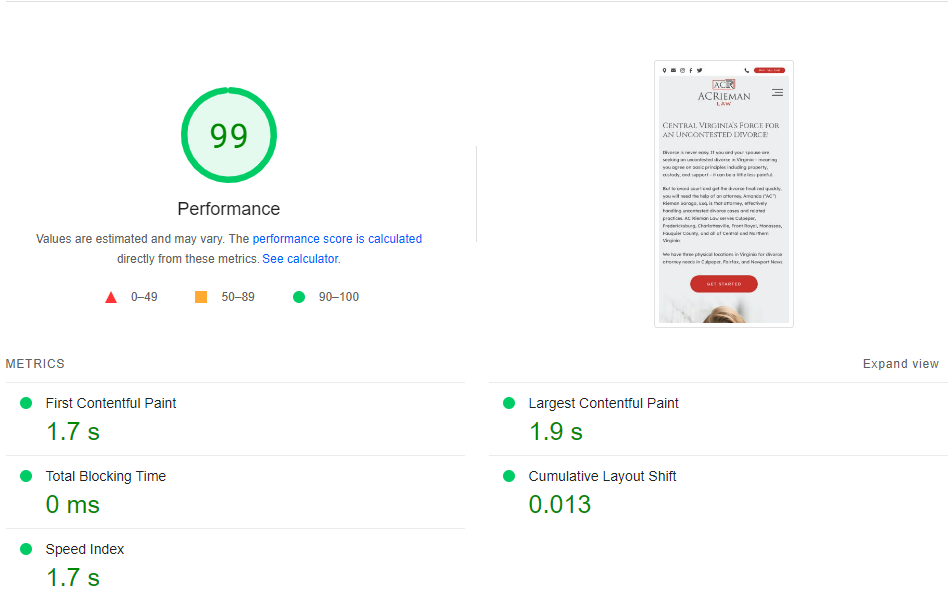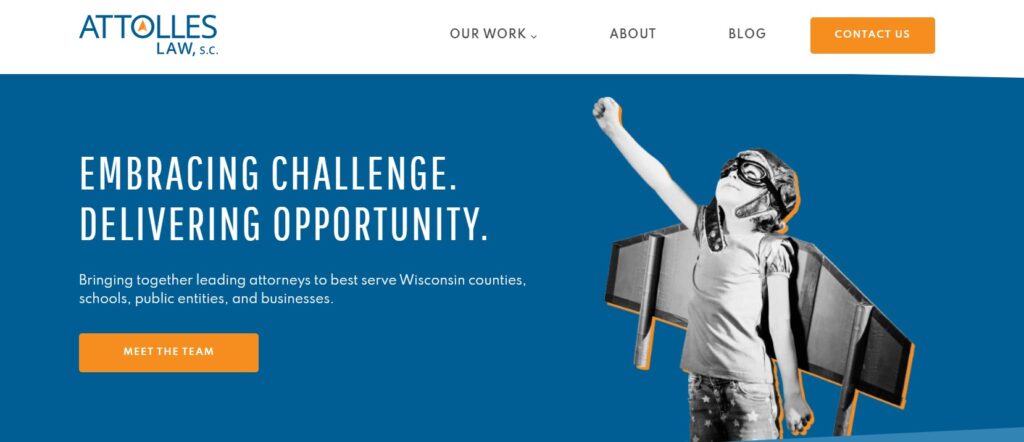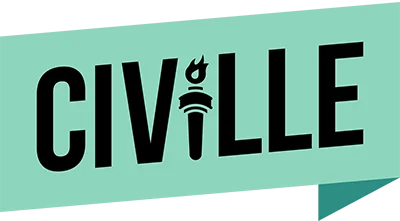
The legal world is changing, and so is how clients find attorneys. In 2025, having a strong online presence isn’t just a good idea—it’s essential. If law firms want to succeed, they need to understand Search Engine Optimization (SEO), and that’s where we come in with our 2025 SEO Guide for Law Firms.
Why SEO Is More Important Than Ever
These days, when someone needs legal help, the first thing they do is go online. They search on Google, hoping to find answers and, hopefully, the right lawyer. This is why it’s important that your firm shows up at the top of search results for the terms that matter the most to you. A good SEO strategy can help you get seen, attract meaningful leads, inspire trust in your firm, and grow your practice.
What’s New in Law Firm SEO For 2025?

AI and Its Impact on SEO
For better or worse, AI is having a big impact on SEO, and that impact is only expected to grow. Google’s AI now appears in search as AI Overview, and it is learning to understand search queries in more nuanced ways. To get seen in this AI Overview, you need to create high-quality, informative content that answers questions and provides valuable and unique information.
As AI-generated content floods the internet, the value of human-created and curated content will only increase. Google’s AI is designed to prioritize original, authoritative content that demonstrates expertise, authoritativeness, and trustworthiness (E-A-T). By focusing on creating content that hits these standards, you can rank and establish your firm as a leader in your field.
The Future of AI and SEO: Navigating the Evolving Landscape
Search engines are no longer just matching keywords. They’re learning to understand the nuances of human language and intent. This means your content needs to be more than just optimized for specific terms. It needs to resonate with both search engines and human readers. Focus on providing valuable information, answering common questions, and offering expert insights. By creating content that truly serves your audience, you’ll naturally attract the attention of search engines and establish your firm as a trusted authority.
Google’s Gemini: A Multimodal Approach

The multimodal AI model that Google Gemini utilizes doesn’t just understand text. It can also process images, audio, and video. Imagine a potential client searching for “car accident lawyer near me.” Gemini can analyze the text of the query, but it can also factor in the user’s location. In the future, you could imagine an analysis of any available images, audio, or video that a user might supply. This lets Google deliver more relevant and personalized search results.
Google is on the cusp of releasing Gemini 2.0, promising even more advanced capabilities. While access is currently limited, early reports suggest significant improvements in language understanding, reasoning, and content generation.
ChatGPT: The Rise of Conversational AI
OpenAI’s ChatGPT has taken the world by storm with its ability to generate human-like text. It’s a valuable tool for brainstorming ideas, creating content outlines, and even generating articles. However, it’s crucial to remember that ChatGPT is still a machine. Human oversight is essential to ensure accuracy, originality, and brand alignment.
OpenAI recently unveiled its most advanced model yet, “o1.” While access to this cutting-edge technology comes with a premium price tag, its potential impact on content creation is undeniable.
The Synergy of AI and Human Expertise
AI is undoubtedly changing the SEO game, but it’s not a replacement for human expertise. The most effective SEO strategies will leverage AI as a powerful tool while keeping humans in the loop. By correctly combining the strengths of both, you can create a winning formula for success.
Content Marketing: Your Secret Weapon in the Digital Courtroom
Content is king, but in the legal realm, it needs to be approachable and informative. Imagine yourself in the shoes of someone facing a legal issue. They’re not searching for complex legal jargon. They want clear and understandable solutions. Anticipate their questions and create articles, videos, or FAQs that provide answers in plain language. Break down complicated legal concepts into simpler terms, using analogies whenever possible. The more genuinely helpful your content is, the more trust you’ll build with potential clients.
Keywords: Unlocking the Secrets of Search
Keywords are the bedrock of your online visibility. They’re the words and phrases potential clients type into search engines when seeking legal assistance. Think of them as the bridge connecting your firm with those who need your services. To effectively utilize keywords, you need to delve deep into keyword research.
Brainstorming and Keyword Research Tools
Start by brainstorming. Put yourself in your ideal client’s shoes. What words would they use to describe their legal issue? What questions would they ask? Consider your practice areas, location, and the specific legal problems you solve.
Once you have a list of potential keywords, leverage keyword research tools like Google Keyword Planner, SEMrush, and Ahrefs. These tools provide important data that can help guide your strategy, including:
- Search Volume: How often people search for a specific keyword.
- Keyword Difficulty: How competitive a keyword is, indicating how difficult it might be to rank for it.
- Related Keywords: Discover variations and long-tail keywords that can expand your reach.

Targeting the Right Keywords
While it’s tempting to focus on high-volume keywords, don’t overlook the power of long-tail keywords. These are longer, more specific phrases that are designed to capture traffic for very specific questions and topics. For instance, instead of targeting “divorce lawyer,” consider “child custody lawyer in [city]” or “high-asset divorce attorney.” Long-tail keywords attract more qualified leads who are actively searching for your specific services.
Read More: How to Craft Long-Tail Keywords
Keyword Placement and Optimization
Once you’ve identified your target keywords, strategically incorporate them into your website content. This includes:
- Page Titles and Headings: Use keywords naturally in your page titles and headings (H1, H2, etc.).
- Meta Descriptions: Craft compelling meta descriptions that include relevant keywords and entice users to click on your search result.
- Website Content: Naturally incorporate keywords throughout your website content, but avoid keyword stuffing, which can harm your rankings.
- Image Alt Text: Use keywords in image alt text to improve accessibility and provide context to search engines.
By performing keyword research and optimization, you can ensure your law firm’s website ranks and attracts the right clients.
The Power of a Blog
Regularly publishing blog posts signals to search engines that your law firm is committed to staying current and providing valuable information. Whether you publish weekly, bi-weekly, or monthly, a consistent schedule keeps your audience engaged and coming back for more.

To maximize your blog’s reach, consider these strategies:
- Connect with your community: Go beyond legal topics and tap into local events, changes in local laws, or pro bono work your firm is involved in. This strengthens your connection to the community and makes your firm more relatable.
- Explore relevant non-legal topics: Carefully curate non-legal content that intersects with your client demographics. For example, if you specialize in estate planning, articles on financial planning could be a valuable addition.
Remember, even when venturing outside purely legal content, ensure it connects to your practice and/or your community. The goal is to demonstrate your understanding of client needs and position yourself as a valuable, holistic resource.
Read More: What Are People Searching for When They Need a Lawyer?
Beyond the Written Word
Not everyone learns best by reading. Diversify your content formats to cater to different preferences. Create short videos summarizing legal concepts, infographics explaining complex processes, or downloadable checklists that provide immediate value. This not only makes your website more engaging but also creates opportunities for your content to be shared and rank in different search formats, like Google Images or Videos.
Other Key SEO Strategies for Law Firms in 2025
The Need for Speed in 2025

In the digital fast lane, every millisecond counts. Website speed is a critical factor in user experience and SEO. Slow loading times can lead to frustrated visitors, high bounce rates, and ultimately, lost clients.
Google’s Core Web Vitals, a set of metrics that measure user experience, places a strong emphasis on website speed. These vitals include Largest Contentful Paint (LCP), which measures how long it takes for the main content of a page to load; First Input Delay (FID), which measures how quickly a page responds to user interaction; and Cumulative Layout Shift (CLS), which measures visual stability and how much elements on the page shift unexpectedly.
To optimize your website speed:
- Optimize images: Compress images to reduce file size without sacrificing quality.
- Leverage browser caching: Allow browsers to store website data locally, so pages load faster on repeat visits.
- Minify code: Remove unnecessary characters from your website’s code to reduce file size.
- Use a Content Delivery Network (CDN): Distribute your website’s content across multiple servers globally, so users can access it from the server closest to them.
By prioritizing website speed, you can improve user experience, boost your search rankings, and attract more clients.
On-Page Optimization: Making Your Website Search-Engine Friendly
On-page optimization is about making your website easy for search engines to understand and rank. This means creating compelling and keyword-rich titles and descriptions for each page. It also means structuring your content with clear headings and subheadings to make it easy to read. Optimizing images with descriptive file names and alt text is important too. You need to do all of this while keeping your page speed in mind, especially for mobile. A slow website can hurt your search rankings and frustrate potential clients.
How to Tell if Your Law Firm’s Website Needs an Upgrade?
Local SEO: Be the Go-To Firm in Your Area
For law firms, local SEO is essential. It makes sure that your firm shows up in search results when potential clients in your area look for legal services. This starts with claiming and optimizing your Google Business Profile. Make sure your profile is complete, accurate, and includes relevant keywords. You also need to list your firm on relevant online directories and legal platforms. Don’t underestimate the power of reviews—positive reviews can boost your local search rankings.
Link Building: Earn Credibility and Improve Rankings
Backlinks are links from other websites to your website. Think of them like votes of confidence. Focus on getting backlinks from reputable websites in the legal industry, local businesses, and other relevant sources. One of the best ways to attract backlinks is to create high-quality content that people want to share.
Technical SEO: The Behind-the-Scenes Optimization
Technical SEO is about making sure your website is in top shape behind the scenes. This means having a clear website structure with a good internal linking strategy so search engines can easily crawl your site. You should also submit a sitemap to Google Search Console to help Google understand and index your pages. Using schema markup can give search engines more context about your content and improve your search results. Don’t forget to regularly check for crawl errors, broken links, and other technical issues that could hurt your rankings.
User Experience (UX): Make Your Website a Joy to Use
User experience is more important than ever for SEO. Search engines like Google prioritize websites that offer a positive user experience because it shows that the website is valuable and relevant. This means making your website easy to navigate, and using clear and concise language. Of course, your website needs to be mobile-friendly and provide a smooth experience on all devices. The real trick is, you need to do all of this while also keeping your website engaging so people want to stay on your site no matter where they land and they want to keep poking around your site looking for more information, resources, etc.

Stay Ahead of the Curve: Keeping Up with SEO Trends
The world of SEO is always changing. To make sure your strategy is effective, you need to stay informed about the latest trends and algorithm updates. Follow industry blogs and publications, attend industry events, and don’t be afraid to try new things and adapt your approach based on the latest developments.
Civille: Your Partner in Legal SEO
SEO can be tricky. At Civille, we’re experts at helping law firms succeed with their online marketing. Our team can help you develop and implement a complete SEO strategy that gets results. We offer a wide range of services, from keyword research and content marketing to local SEO and website development. Contact us today to learn how we can help your law firm succeed online.





